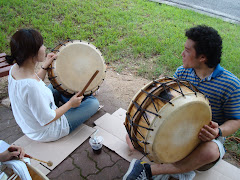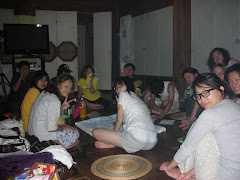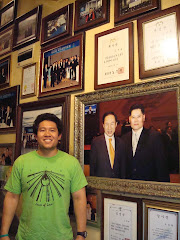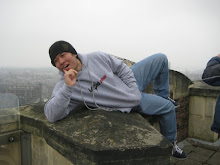Some interesting things have come up recently. But before I go into them, I want to recap a fun story that happened during class a couple of weeks ago. We were going over a dialogue that involved approaching an academic administrator and bringing up some sort of complaint relating to the school. Now these dialogues that we methodically go over in class are all hypothetical situations that we might encounter in the future in Korea. However, in order to make these situations more realistic, my teacher for some strange reason thought it would be a good idea for me to actually utilize this dialogue in a real-life situation. Thus, in the middle of our class she made me go to the 7th floor where the administrators' offices are and give a complaint, just like our dialogue had. And since the clock in our classroom was broken, this would be the perfect thing to ask the administrator's to fix. I involuntarily agreed to carry out this task and reluctantly made my way down to the 7th floor, trying quickly to remember how the dialogue went. Once in front of the administration office, I approached one of the workers and informed her why I had come--our clock needed to be fixed. What a good reason. I definitely made a lot of mistakes throughout the whole conversation, probably because I was nervous and caught off guard quite a bit by the whole situation. Amazingly, however, the conversation was almost exactly the same as the dialogue we were studying in class. Although I was hesitant to carry out this task at first, I definitely benefitted from going out of my comfort zone and engaging in a real situation. Moreover, it showed how useful the dialogues we study can be and how similar they are to real-life conversation, as they can sort of seem redundant at times after studying them in class over and over again. After it was all over, I wondered whether or not the whole thing was staged, considering how close the conversation and dialogue in our student books were. Oh, and our clock eventually got fixed.
So there is this girl in my class named Valerie. She is from San Francisco but has been living in Korea for about 17 months (and I thought two and a half months was a long time!). I've definitely learned a lot from her and she casts a new light on Korean culture and life that I had not seen before. Over the past four weeks of being in class together, we've both found that we barely share anything in common, which is probably one of the reasons why we've become friends. She loves rock music, I abhor it. I love the winter season, she abhors it. She loves horror films, I love chick flicks. She also doesn't feel a strong connection to her home in San Francisco, whereas I definitely feel like my home in Hawai'i is where my roots are. Despite our differences, I've come to respect a quality of hers, one that I don't really have (another one of our differences), which is her bluntness; she speaks her mind loudly and doesn't care at all what other people think about what she says. For example, we'll be the only two foreigners eating in a Korean restaurant amongst other Korean people, and she'll blurt out everything that is wrong with the Korean education system or some other sort of negative remark about the country. At first I sort of had to duck my head below the table, but I've become used to her brutal frankness and dealing with it. Obviously seeing Korea through another foreigner's or American's eyes will be different from a Korean perspective, but after living in Korea for 17 months, Valerie definitely paints a vivid picture of the realities of Korea. And while at times I think her bluntness could be tempered with restraint and awareness of others around her, her lack of inhibitions and reservations when speaking is something I admire. Maybe we aren't as different as we think. Although I know I'll never like rock music.
So in news around the hasukjib.....Last night we had an interesting conversation during dinner. Usually when Nuna and the Korean students are talking in Korean, I basically do the best that I can to piece together their conversation like a puzzle from the words and grammar that I can pick up. In the conversation last night, for about half of the conversation the only words and phrases that I could pick up were "man", "person living on the first floor", "scary", "going out to smoke a cigarette", "lying about not eating breakfast", and "uncomfortable." As you can see, it can be interesting trying to imagine and put together a coherent story from this list of miscellaneous words and phrases. It wasn't until the end of the conversation that I finally understood what they were talking about for the past twenty minutes. This sort of thing happens often when I reach an epiphany and understand the conversation in its entirety! When this occurs, most times one of the Korean students has taken the time to tell the whole story at a slower pace for me on the side in order for me to understand. Well, anyway, last night's conversation was about the possibility that one of the students living in the hasukjib was gay. Apparently, as the conversation went, he had been sneaking in late at night as well as living with another male friend in his room at the hasukjib. Although he had tried doing this secretively, Nuna had become aware of this covert operation. One of the girls who lives on the same floor as this guy seemed paranoid about the whole situation and said she was scared. She had seen the two men go into the room together. I asked her "무슨 소리가 나와요?" and she found that amusing. I told her that I had gay friends back at school and that it's actually quite common. This conversation over dinner was the first and only time that homosexuality had come up since I've been here. I definitely have not seen any signs of it out in public. The fact that we could openly discuss and talk about the issue together, however, was a sign of tolerance.
Tonight, I had another good dinner at my hasukjib. Not only was the food delicious, but the company was quite good as well. After I finished eating, I managed to stay another hour inside with Nuna, just talking. Another reason I stayed longer, I must say, was because Nuna let Tallay, her Boston Terrier, out of her room to play. I miss my dogs back home and will jump on any opportunity to have some dog time. Nuna actually got a little jealous because Tallay would stay by my side, even when Nuna called her. At one point, she even told Tallay to go back home to Hawai'i with me, since Tallay seemed to have a fancy for me. "누구랑 살아요?!" she asked Tallay ("Who do you live with?"). I feel like Nuna has opened up to me a bit more since I first came to the hasukjib. She actually seems interested to talk to me now which is encouraging. I think she likes having the company of the students here, since it seems like it can get lonely when she's all by herself. I'm still not exactly sure what her family situation is. I've seen her husband once, but I don't think they live together. And her daughter only visits the hasukjib at certain times. In any case, I'm thankful for Nuna's hard work and kindness.
So as far as first-time experiences go, I went on my first 노래방 adventure today (노래방 is like a karaoke room). It was fantastic. As soon as we entered the 노래방 we were surrounded by swirling neon lights and bumping music. The room we were in was totally souped up with comfortable couches and intense sound systems. Since coming to Korea, I've sort of familiarized myself with the vibrant pop scene, and have become a fan of some of the Korean singing groups. I attempted a couple of Korean songs that I knew of, but soon found out that I still need a lot of practice. I'll probably study up on the lyrics at some point again so that the next time I go back to a 노래방 (there will definitely be a next time!) I'll be a little sharper on my lyrical expression and dance moves.





















































































































